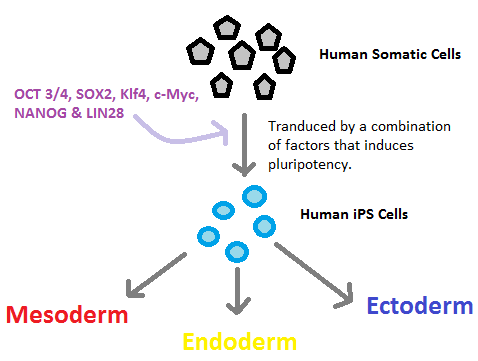Could We Be Protected From Cancer By A Vaccine Made From Stem Cells
It could be a breakthrough. A crazily simple idea has worked and suddenly we may have a weapon that could help us beat tumors. Stanford scientists have amazed the whole world with their new study. Of course, we should be cautious and the treatment won’t be available right now but if the treatment is proven to work in humans we could get something truly amazing.

Overview of iPS cells - Source: Humanips (Own work) CC BY-SA 3.0], via Wikimedia Commons
A team from the Stanford University has discovered that when they inject induced pluripotent stem cells (iPSC) into mice it creates a strong immune response against many types of cancer. iPSCs are cells that originate from common tissue like from skin or blood. Then they are transformed into stem cells through a sophisticated genetic process. The researchers Nigel Kooreman and his coworkers first noticed that iPSCs and the cells of tumors are very similar. Then they decided to use this to their advantage.
And it wasn’t that much of a surprise that it actually worked. It’s been a century when scientists found out that if they inject an animal with embryonic material it helps to prevent the problem with transplanted organs. Later vaccines against tumors made from embryonic stem cells appeared. But the usage of embryonic stem cells does bring a few problems. First of all, many people have ethical problems with their usage. But they also aren’t genetically compatible with the vaccinated person which increases the risks and lowers the effectiveness. But iPSC is made from the same genetic code as the vaccinated person so they nicely get around this problem.
Joseph WU: "Stem Cells and Genomics for Precision Medicine” - Source: Fondazione Internazionale Menarini
So the scientists started an experiment in which they first created iPSC for lab mice. Then they vaccinated the mice and after four weeks injected them with breast cancer. They then did the same for skin cancer and lung cancer. And the results were astounding. 70 % of the mice had a substantial tumor size reduction and in some, the tumors completely disappeared. Mr. Kooreman says this procedure is extremely effective as it can be used to train the immune system to many kinds of cancer at the same time. The largest concern was whether this procedure would cause autoimmunity problems. But that didn’t happen.
The obvious question now is whether this vaccine will work on humans as well. That’s why Kooreman with his coworkers are gonna start a round of experiments on laboratory cultures of human cells and then clinical tests on human patients. And while lots of works remain this could be a very elegantly simple way to treat cancer.
Sources:
Quality info and really decent sources, upvoted & resteemed.
thanks you :) I'm glad you liked it
Immunomodulation for cancer treatment is a very exciting area of research! Using induced stem cells as opposed to embryonic stem cells solves an ethical conundrum that would have probably otherwise prevented the use of this type of therapy in humans. Also - the iPSC therapeutic strategy allows cells to be exposed to epitopes (proteins that stimulate the immune system) that we don't know about yet, a limitation of current T-Cell therapies. It is important to mention that these immune responses weren't accomplished with iPSCs alone, but with irradiated iPSCs. This essentially lyses the cells and allows the cell's proteins to dump into the blood stream so that the immune system can be activated. Also! Unmethylated DNA was added to the irradiated iPSCs in the most effective treatment group. Unmethylated DNA is something that is present in non-differentiated cells, a characteristic which is often shared with cancer cells who are thought to "de-differentiate" from their tissue of origin (often referred to as the epithelial to mesenchymal transition). These results are interesting even though the 70% figure is from an experiment with an n of 10. The p value is 0.0001 which is pretty tasty. One should keep in mind though that murine (mouse) immune systems are really different from human immune systems. The mouse strains used in this study - the C57BL/6 and FVB mouse strains are known to be fairly resistant to developing tumors. Also, after reading the paper, I didn't see any experiment to test if there were any adverse side affects (it's probably in the supplemental methods). One would think that this type of therapy could cause an adverse reaction and a potential immune response against normal stem cells. This being said, I think this is a very promising study. Whenever you look at a paper - note the quality of the journal. Cell is a very prestigious journal but everyone makes mistakes.
Holy crap, this is one hell of a comprehensive reply. And a great one!
I just want to say, I'm not really an expert on most of the topics I write about. I just love science and think it is the way to change the world for the better. And since I'm a bit too, well, stupid to actually help science as a scientist I chose the path of popularizing science. So I do tend to "dumb down" whatever I read and stuff gets missed while doing that.
And I do skim through many scientific papers a day and read at least two a day. That sadly often doesn't leave me with the time to check up on every single claim in the papers.
But again, my goal isn't to critzize the papers at all
You did a great job - that's why I read the paper. We need as many people as possible disseminating science research. Science and reason are two of the most powerful tools we have at our disposal.
Stay curious